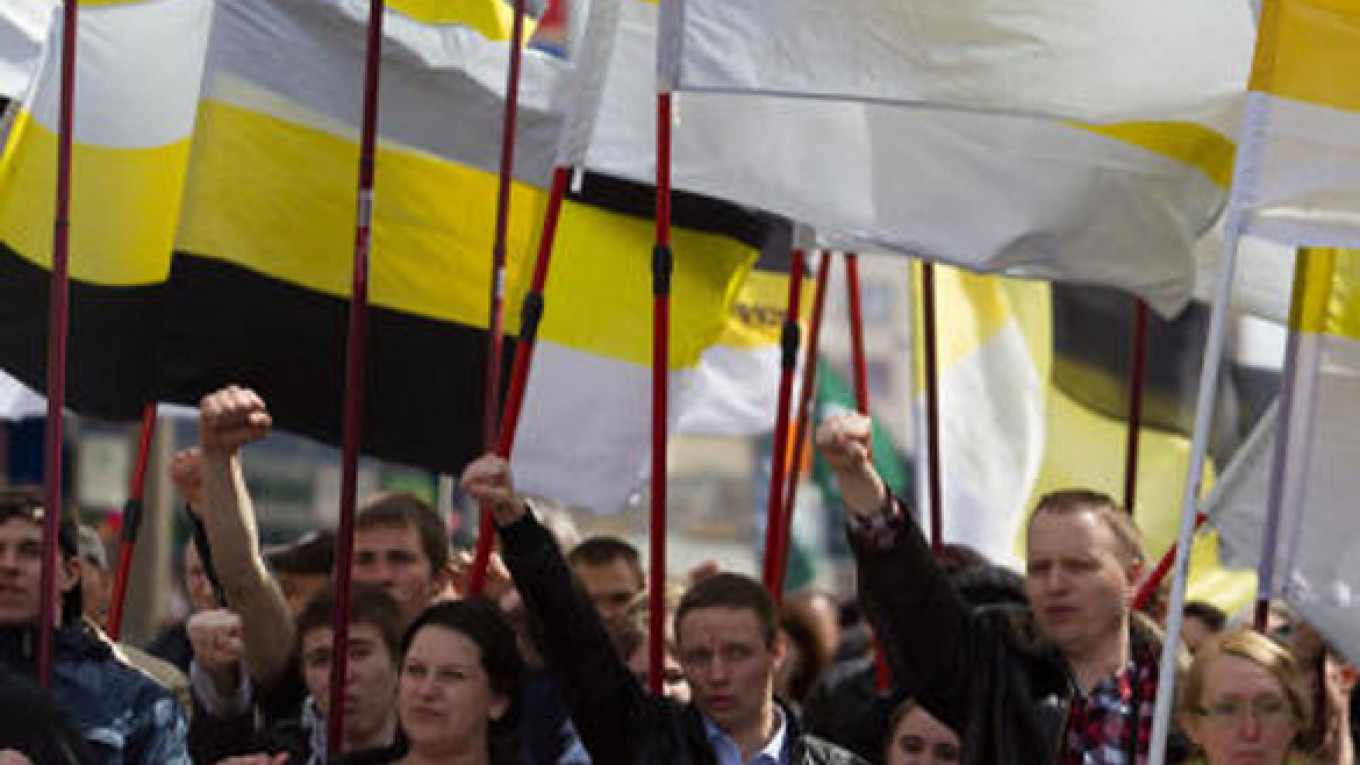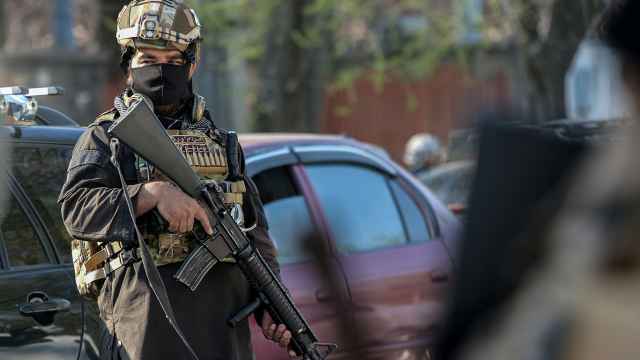A day after hundreds of detentions at numerous nationalist rallies across the country,
media reports circulated Tuesday that the government is considering creating an interethnic relations ministry to keep tensions under control.
Immigration has dominated the Russian media landscape since thousands took part in a nationalist riot in the Biryulyovo district in southern Moscow last month. On Monday, nationalists exploited the issue at their annual Russian March, a rally that drew thousands of people and resulted in more than 200 arrests for various violations all over the country.
Nationalist sentiment may also be behind several outbursts of violence that took place in the wake of the march.
Moscow police detained neo-Nazi teenagers accused of beating "almost to death" a 42-year-old man they mistakenly thought was a migrant, Life News reported Tuesday. The beating was allegedly part of the "White Metro Car" event, which saw nationalists attack migrants in the metro.
Meanwhile, in St. Petersburg an Uzbek citizen was killed Monday, daily newspaper Metro reported Tuesday. According to the report, investigators believed the victim may have been killed by nationalists.
On Monday, nationalists also organized a pogrom at a market near St. Petersburg's Udelnaya metro station, and they beat up people they believed to be migrants in the metro, breaking up kiosks and even shooting, though it is unclear what weapons were fired, Metro reported.
In parallel with such ethnic tensions, several cities experienced a transportation catastrophe on Tuesday when minibus taxi drivers all over Russia refused to work because of new legislation targeting those with foreign drivers' licenses. The law imposes penalties on all drivers who fail to obtain Russian licenses.
Immigration and interethnic relations have become a major priority for authorities, who pledged to introduce tougher immigration legislation following the Biryulyovo riots.
On Tuesday, Kommersant cited Kremlin and Cabinet sources to report that the department of the Regional Development Ministry responsible for interethnic and interfaith relations, which had so far been a secondary one, would become the driving force of the ministry's activities.
"This is effectively the re-creation of the Ministry for Federative, Ethnic and Migration Policy," one of the sources cited said.
Yevgenia Savina, a spokeswoman for the Regional Development Ministry, told The Moscow Times that the ministry would be able to devote more time to interethnic relations after the transfer of its housing and utilities functions to the newly created Construction, Housing and Utilities Ministry last week.
"There will be more opportunities to focus on other issues, including interethnic relations," she said.
But Savina said that so far, there had been no decrees or instructions from the Cabinet on transforming the Regional Development Ministry into an interethnic relations ministry.
Kommersant also said authorities planned to set up an agency supervised by the Regional Development Ministry with branches in all regions to monitor ethnic tensions and conflicts. But the ministry's structure will become clear only when President Vladimir Putin gives specific instructions determined by a meeting of the presidential council for interethnic relations held in October, a source close to the presidential administration said.
The Kremlin is also urging regions to create a position of deputy governors in charge of interethnic relations, according to the newspaper.
Alexei Mukhin, head of the Center for Political Information, said by phone that the creation of an interethnic relations ministry would be a mistake and that it would not be able to meet the challenges posed by ethnic issues.
"Interethnic relations are an issue that is too nuanced and cannot be entrusted to bureaucrats," he said.
Instead, Mukhin suggested appointing a strong politician as ombudsman for interethnic relations.
An interethnic relations ministry was first created in 1917, when tensions between various ethnicities escalated during the collapse of the Russian Empire. Its first and only head was Josef Stalin, who served as people's commissary for ethnic affairs until 1923.
When ethnic conflicts flared up again during the Soviet Union's breakup, a state committee for ethnic issues was set up in 1989. It was transformed into a ministry in 1994 and dissolved in 2001. From 2001to 2004, interethnic relations were supervised by Vladimir Zorin, a minister without portfolio.
Contact the author at o.sukhov@imedia.ru
A Message from The Moscow Times:
Dear readers,
We are facing unprecedented challenges. Russia's Prosecutor General's Office has designated The Moscow Times as an "undesirable" organization, criminalizing our work and putting our staff at risk of prosecution. This follows our earlier unjust labeling as a "foreign agent."
These actions are direct attempts to silence independent journalism in Russia. The authorities claim our work "discredits the decisions of the Russian leadership." We see things differently: we strive to provide accurate, unbiased reporting on Russia.
We, the journalists of The Moscow Times, refuse to be silenced. But to continue our work, we need your help.
Your support, no matter how small, makes a world of difference. If you can, please support us monthly starting from just $2. It's quick to set up, and every contribution makes a significant impact.
By supporting The Moscow Times, you're defending open, independent journalism in the face of repression. Thank you for standing with us.
Remind me later.






